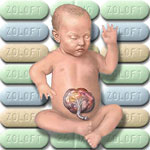Zoloft Lawsuits and Omphalocele
 The anti-depressant Zoloft has been linked to a host of severe birth defects when taken by mothers during pregnancy. Many Zoloft lawsuits have been filed by parents seeking compensation on behalf of their children for the medical expenses, treatment, and pain and suffering caused by such birth defects. One of the many birth defects associated with this drug is omphalocele.
The anti-depressant Zoloft has been linked to a host of severe birth defects when taken by mothers during pregnancy. Many Zoloft lawsuits have been filed by parents seeking compensation on behalf of their children for the medical expenses, treatment, and pain and suffering caused by such birth defects. One of the many birth defects associated with this drug is omphalocele.
What is omphalocele?
Omphalocele is a congenital birth defect in which a baby’s abdominal organs or intestines protrude outside the body, sticking out through the navel. The organs are covered with a clear membrane, but clearly visible through it. In some cases, this membrane or sac may be broken. Omphalocele is immediately obvious at birth.
During pregnancy, a fetus’ abdominal organs begin developing outside the body, but by the 10th week of gestation, all organs and intestines are inside the body. However, if something interferes with this process, the organs may remain outside, which can cause damage to the organs and interfere with the stomach’s growth process.
How omphalocele is treated
Omphalocele is treated with surgery, the timing of which depends on the size of the omphalocele: if it is small, the surgery will be done soon after birth, but if it is large, the surgery is delayed until the stomach grows large enough to hold the protruding organs or intestines. In some cases, more than one surgery may be necessary to correct the condition. There is a 90% survival rate of infants with successful surgeries for omphalocele, but the survival rate is lower among infants who have other birth defects in conjunction with omphalocele, such as heart defects, neural tube defects, chromosomal abnormalities, or congenital diaphragmatic hernias.
Zoloft linked to birth defects
Studies have shown a link between birth defects such as omphalocele and use of SSRI antidepressants like Zoloft during pregnancy. Two such studies were published in the New England Journal of Medicine in 2007, both finding an increased risk of birth defects like omphalocele in mothers who took Zoloft while pregnant.
Other known birth defects resulting from Zoloft use during pregnany include congenital heart defects, neural tube defects, cleft lip and cleft palate, limb abnormalities such as club foot, persistent pulmonary hypertension of the newborn (PPHN), anal atresia (partial or complete closure of the anus), and craniosynostosis (malformed skull).
Parents whose babies were born with omphalocele or other birth defects because the mother used Zoloft during pregnancy without knowing of the drug’s risks may be eligible for a financial settlement by filing a lawsuit on behalf of their child.
[SmartLink zoloftlawsuit]

